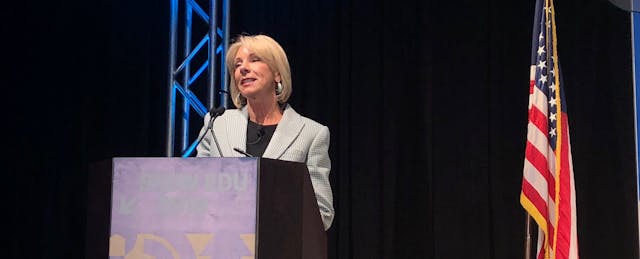At a panel session at SXSW EDU on Tuesday, Education Secretary Betsy DeVos asked speakers what they might do if they had her job for a day. Now, the Education Department’s Office of Educational Technology is soliciting ideas from, well, everyone in what’s been named the “Higher Education Ecosystem Challenge.”
The challenge puts a focus on so-called “lifelong learning,” the idea that gaining skills and knowledge doesn’t happen only in a college or school setting. And as digital learning has expanded over the years, educational institutions increasingly include online courses, short-term credential programs or skills-based bootcamps.
A growing group of education providers, many coming out of Silicon Valley, are tapping into the market by offering these kinds of alternative education. But one challenge with more educational opportunities—many of which are unaccredited, private for-profit startups or otherwise an experiment—has been whether or not employers actually take these learning upstarts seriously.
That often comes back to a lack of standardization across new and old learning opportunities. Groups such as the Lumina Foundation have come forward with their own proposals about how to chip away at the issue, backing efforts such as Credential Engine, a living registry of “comparable information” about credentials ranging from degrees to certificates, badges, apprenticeships or microcredentials.
Past Administrations have also tried challenges before to spark experimentation, with mixed results.
Martin Kurzweil, director of educational transformation at Ithaka S+R, did an analysis of the impact of the Race to the Top grant program and the No Child Left Behind waivers during the during the Obama administration. He said in an interview that during the Race to the Top program, many states made an initial burst of activity in response to the incentive, but that the effort “was not very effective at sustaining momentum.”
Information about the latest higher-ed challenge remains sparse on the initiative website, and the Department has not yet disclosed how the challenge will be funded.
What’s clear so far from a post by officials at the Office is that the program will be “looking for multi-sector teams to propose design concepts for a truly student-centered ecosystem— including a roadmap for multiple systems and stakeholders and pilots for the technology that will underpin and enable” collaboration between colleges, employers and alternative education providers. The announcement stated more information will be announced this spring.
It’s not the first time that the department has drawn attention a need for better collaboration among various education providers and employers, though. A 2017 report issued by the Education Department Office of Educational Technology reads:
“What may be needed for the new normal postsecondary student is broader ecosystem opportunities to learn within both traditional institutions and new providers, underpinned by a digital infrastructure that allows students to create, recognize, and value quality learning experiences wherever and whenever they are most convenient, and that rewards the expertise they develop within and outside of formal institutions over their lifetimes. This vision of the higher education sector would further allow students to move much more fluidly in and out of different types of institutions, depending on their needs, and transfer as they relocate or pursue increasingly demanding education and career paths.”
Some of the government’s areas of interest for the challenge have already been hinted at. One example is blockchain technology, a topic that officials from the Office of Educational Technology led a brainstorming workshop on at the 2017 EDUCAUSE conference. The idea—which raises tough questions due to the uncertainty of the new technology—would be issue learning credentials using distributed ledgers in an effort to allow students to control their learning records rather than, for example, a university registrar.
Other solutions and technologies, perhaps introduced to solve the challenges inflated by the new education providers, will undoubtedly draw curiosities and difficult questions as well.


